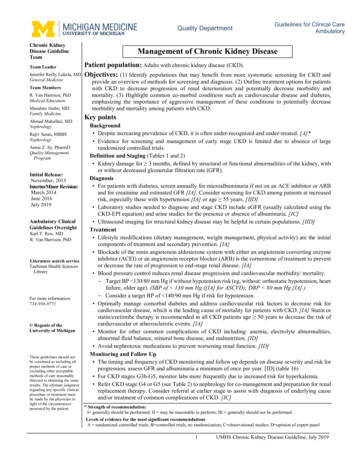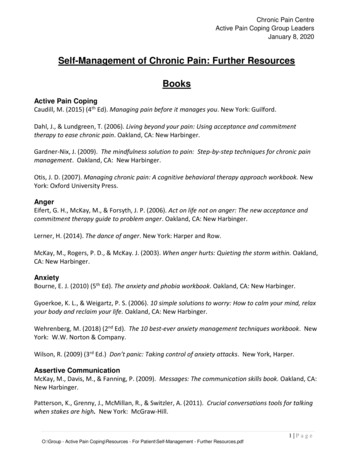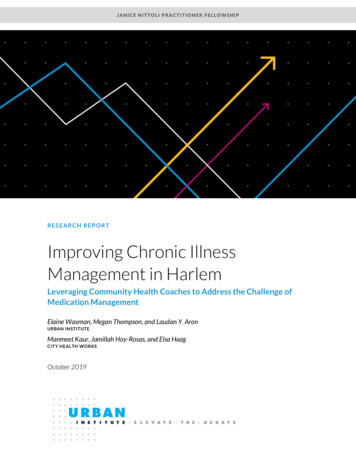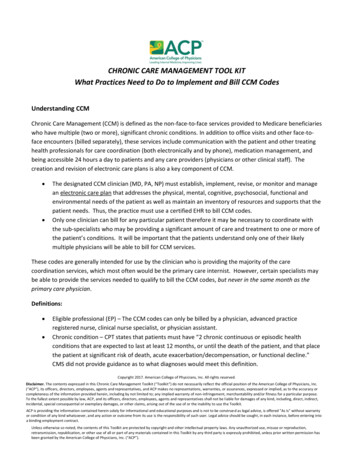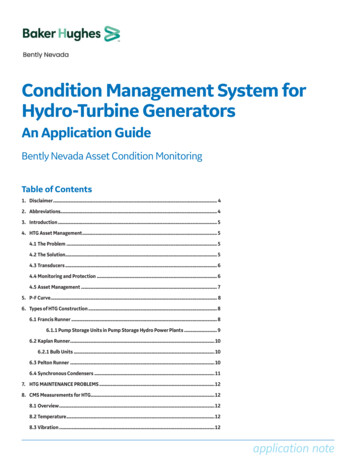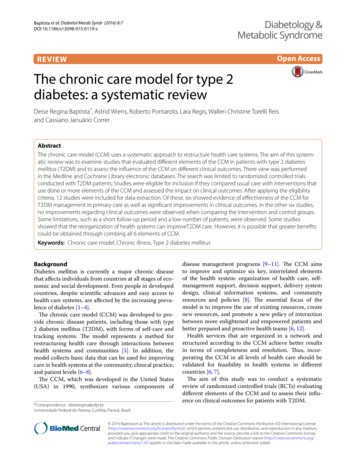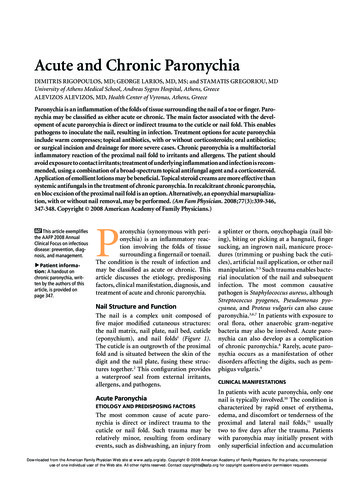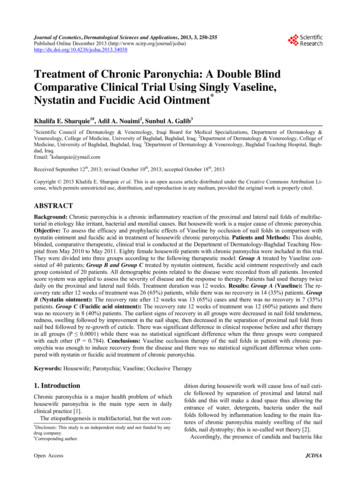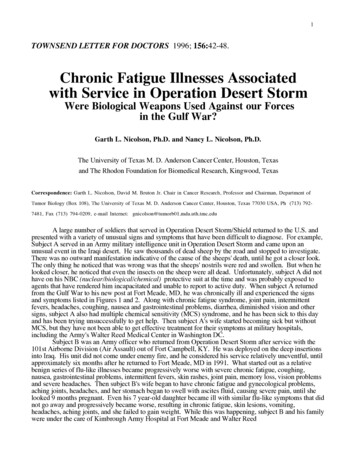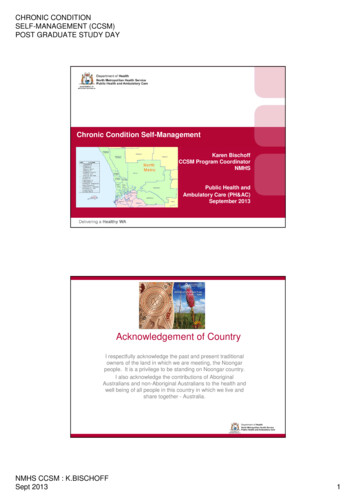
Transcription
CHRONIC CONDITIONSELF-MANAGEMENT (CCSM)POST GRADUATE STUDY DAYChronic Condition Self-ManagementKaren BischoffCCSM Program CoordinatorNMHSPublic Health andAmbulatory Care (PH&AC)September 2013Slide 1Acknowledgement of CountryI respectfully acknowledge the past and present traditionalowners of the land in which we are meeting, the Noongarpeople. It is a privilege to be standing on Noongar country.I also acknowledge the contributions of AboriginalAustralians and non-Aboriginal Australians to the health andwell being of all people in this country in which we live andshare together - Australia.NMHS CCSM : K.BISCHOFFSept 20131
CHRONIC CONDITIONSELF-MANAGEMENT (CCSM)POST GRADUATE STUDY DAYUnderstand the role of Self-management Support in the delivery of chronic careUnderstand the Policy context fordelivering chronic careUnderstand theConsumer andCommunityperspective livingwith a chronicconditionUnderstand theHealth Systemcontext fordeliveringchronic careGain an overviewof the skillsconsumersrequire to selfmanage theirconditionsGain an overview ofHealth Providers skillsrequired by to deliverSelf-managementSupport to consumersIdentify how you can improve yourdelivery of Self-management Support inyour work placeInvitation to participate in embedding CCSM Support processContact: Karen.Bischoff@health.wa.gov.auNMHS CCSM : K.BISCHOFFSept 20132
CHRONIC CONDITIONSELF-MANAGEMENT (CCSM)POST GRADUATE STUDY DAYChronic Condition ‘any ongoing or recurring health issue that hasa significant impact on the lives of a person and/ortheir family, or other carers.eg chronic pain, asthma, arthritis, coronaryvascular disease, cancer, anxiety, depression,diabetes, alcohol and drug dependency’.World Health OrganisationTerminology VariationsConsumer patient person clientmay include family, carers, guardiansHealth Provider clinician health professional HPmay include family, carers, guardians and healthcareorganisations consumers carersChronic condition Chronic disease Long term health conditionChronic Disease Management ; Chronic Care ModelsSelf Care; WellnessNMHS CCSM : K.BISCHOFFSept 20133
CHRONIC CONDITIONSELF-MANAGEMENT (CCSM)POST GRADUATE STUDY DAYtheConsumerandCommunityperspectiveliving with achronicconditionChronic Condition CharacteristicsInclude: Complex causes Multiple risk factors Long latency periods Prolonged course of illness Functional impairment or disability.NMHS CCSM : K.BISCHOFFSept 20134
CHRONIC CONDITIONSELF-MANAGEMENT (CCSM)POST GRADUATE STUDY DAYChronic vs Acute nyUsually oneDurationIndefiniteShortDiagnosisOften uncertain in earlystagesCommonly accurateTreatmentCure rare, so CARECommon CURERole of ClientPartnership HP ClientFollow ordersPossible Condition Life CoursesLiving well with a chronic conditionNMHS CCSM : K.BISCHOFFSept 20135
CHRONIC CONDITIONSELF-MANAGEMENT (CCSM)POST GRADUATE STUDY DAYLiving with a chronic conditionWho istheHealthProviderNMHS CCSM : K.BISCHOFFSept 20136
CHRONIC CONDITIONSELF-MANAGEMENT (CCSM)POST GRADUATE STUDY DAYIndividualsIndividualsIndividualsPotential for ImpactEveryday living with a chronic conditionSelfManagementProfessional CareNMHS CCSM : K.BISCHOFFSept 2013HumanBehaviourand Lifestyle7
CHRONIC CONDITIONSELF-MANAGEMENT (CCSM)POST GRADUATE STUDY DAYWhat is the consumer’s health AGENDA? Keepinghealthy at home andin the community Quality of LifePeople living with chronicconditions are healthproviders in their own right.Each has their own individualagendas/ needs/ culturewhich influence theirdecisions about their health.NMHS CCSM : K.BISCHOFFSept 20138
CHRONIC CONDITIONSELF-MANAGEMENT (CCSM)POST GRADUATE STUDY DAYthe HealthSystem contextfor deliveringchronic careHealth SystemReforms1800’sImprovements inPublic HealthNMHS CCSM : K.BISCHOFFSept 20131842Anaesthesia1867Antiseptic Surgery1876Bacteria1892Diphtheria irin1872Chloroform used insurgery in WA9
CHRONIC CONDITIONSELF-MANAGEMENT (CCSM)POST GRADUATE STUDY DAYHealth SystemReforms1800’sImprovements inPublic HealthNMHS CCSM : K.BISCHOFFSept 20131900’sInfectious Diseases:Many becamepreventable andcures found10
CHRONIC CONDITIONSELF-MANAGEMENT (CCSM)POST GRADUATE STUDY DAY1900’sVACCINES developed for: DiphtheriaWhooping coughTuberculosisTetanusYellow feverTyphusInfluenzaPolioRubellaMeaslesChicken poxMumpsPneumoniaHepatitis A and BMeningitis(Smallpox eradicated)(Leukemia-fighting drug)1899Women vote1914World War I1929The Great Depression1939World War II1943Penicillin1944Unemployment and sicknessbenefits1944/9 Medical Benefits scheme1946Public Health system open toall WA’ns not just destitute1958(Royal) Perth Hospital1958Chest Clinic;1963 SCGH1982First AIDS case recorded1983MedicareHistoric foundations1855 : Convict built Colonial Hospital,later renamed the Perth PublicHospital, the Perth Hospital and, in1946, the Royal Perth Hospital.Royal Perth Hospital Opening 1948NMHS CCSM : K.BISCHOFFSept 201311
CHRONIC CONDITIONSELF-MANAGEMENT (CCSM)POST GRADUATE STUDY DAY‘CURE’Reactive, Episodic, Didactic Instructions, medications, treatmentsHealthProviderEPISODEConsumer(Passive Role)(Active Role)‘The Consultation’Consultation’or Partnership approachHealth SystemReforms1800’sImprovements inPublic Health1900’sInfectious Diseases:Many becamepreventable andcures found2000’sChronic Conditionsfrom ‘CURE’to ‘CARE’and PreventionNMHS CCSM : K.BISCHOFFSept 201312
CHRONIC CONDITIONSELF-MANAGEMENT (CCSM)POST GRADUATE STUDY DAYAUSTRALIANS WITH CHRONIC CONDITION(S):Australian Institute of Health Welfare (AIHW) , 2006Living with ChronicCondition (s)75%Not 25%Living Longer with a ConditionAustralia’s Health in 2010 – In Brief , AIHW, 2010NMHS CCSM : K.BISCHOFFSept 201313
CHRONIC CONDITIONSELF-MANAGEMENT (CCSM)POST GRADUATE STUDY DAYHigh Co-morbidity of Chronic ConditionsInequity in Health StatusAboriginalpeople are6.6 x morelikely to die ofDiabetes thannon-Aboriginalpeople.Australia’s Health in 2010 – In Brief , AIHW, 2010NMHS CCSM : K.BISCHOFFSept 201314
CHRONIC CONDITIONSELF-MANAGEMENT (CCSM)POST GRADUATE STUDY DAYCHRONIC CONDITIONS and link toPreventable Risk FactorsFiona Stanley HospitalEpisodic versus Longitudinal CareNMHS CCSM : K.BISCHOFFSept 201315
CHRONIC CONDITIONSELF-MANAGEMENT (CCSM)POST GRADUATE STUDY DAYReid Report :A Healthier Future for WesternAustralians (2004)NOWFUTUREWhat is the health system AGENDA?PROVISION of HEALTHCAREFUNDING, RESOURCESREGULATION, REFORMHealthier, longer, better quality of life for allThe Mission: Improving, promoting, protecting Caring for those who need it most Making the best use of funds and resourcesWORKFORCE SAFETY,QUALITYEQUITY, ACCESS RESEARCHNMHS CCSM : K.BISCHOFFSept 2013 Managing limited resources16
CHRONIC CONDITIONSELF-MANAGEMENT (CCSM)POST GRADUATE STUDY DAY From systems of episodic‘cure’ To coordinated,multidisciplinary services ofongoing ‘care’ In partnership withconsumers.the Policy context for delivering chronic careNMHS CCSM : K.BISCHOFFSept 201317
CHRONIC CONDITIONSELF-MANAGEMENT (CCSM)POST GRADUATE STUDY DAY Evidence shows embeddingChronic Condition SelfManagement requires morethan just education of healthproviders and consumersalone. A multi-level, multi-component,system-wide approach, acrossthe continuum of care isrequired.CONTEXTChronic Care Models Chronic Care Pyramid Balance of CareINTERNATIONAL LEVELProfessional Care vs. Self ManagementWA Health Models of Care WA CC/CCSM Frameworks Health Services (NMHS) NGOs, Local Governments CommunitiesNMHS CCSM : K.BISCHOFFSept 2013COMMUNITY STATE / AHSNational Chronic Disease StrategyNATIONAL 18
CHRONIC CONDITIONSELF-MANAGEMENT (CCSM)POST GRADUATE STUDY DAYThe Chronic Care Model (CCM)Original WAGNERCCM around the EBECWashington USANMHS CCSM : K.BISCHOFFSept 201319
CHRONIC CONDITIONSELF-MANAGEMENT (CCSM)POST GRADUATE STUDY DAYICCCFINNOVATIVE CARE FORCHRONIC CONDITIONS FRAMEWORK (ICCCF),World Health Organisation (WHO) 2002ICCCF is basis for WA Health Modelsof ICCC/en/DefinitionsSelf-management is ‘the active participation bypeople in their own health care’.Self-management support is what health providers,organisations and the community does to assistpeople living with chronic conditions to better ‘selfmanage’.NMHS CCSM : K.BISCHOFFSept 201320
CHRONIC CONDITIONSELF-MANAGEMENT (CCSM)POST GRADUATE STUDY DAYInnovative Care for Chronic Conditions Framework4. CommunitySELFMANAGEMENT3. Health System2. Health CareProviders1. C/en/Innovative Care for Chronic Conditions FrameworkSELF-MANAGEMENT SUPPORT4. Community3. Health System1. Consumer2. Health t/ICCC/en/NMHS CCSM : K.BISCHOFFSept 201321
CHRONIC CONDITIONSELF-MANAGEMENT (CCSM)POST GRADUATE STUDY DAYDefinitionsContinuedThe self-management approach emphasises the consumer’scentral role in managing their health anywhere along the carecontinuum;Self-management programs and services offer consumersthe knowledge, skills and resources to help them bettermanage their ---------------------------Self-management is ‘the active participation by people in their own health care’.Self-management support is what health providers, organisations and the communitydoes to assist people living with chronic conditions to better ‘self manage’.Chronic Condition PyramidHIGH COMPLEXITY100% of thepopulationHIGHER RISKDIAGNOSED, STABLEUNDIAGNOSED, AT RISKWELL POPULATIONBased on: UK Department of Health (2005) Improving chronic diseasemanagement [Kaiser Permanente Care Management Institute,California, USA]NMHS CCSM : K.BISCHOFFSept 201322
CHRONIC CONDITIONSELF-MANAGEMENT (CCSM)POST GRADUATE STUDY DAYIdeal Balance of CareComplex Carewith comorbiditiesPSHigher RiskCaseselfro-MDiagnosedand StableHigh proportion ofprofessional carefeanssioagenalmeEqually sharedcareCnHigh proportion of Selfa Management/CareretAt Risk, Undiagnosed andWell populationIdeal Balance of CareComplex Carewith comorbiditiesHigher RiskCasesActual line?Diagnosedand StablePSelfro-MHigh proportion ofprofessional carefeanssioagenalmeEqually sharedcareCnHigh proportion of Selfa Management/CareretAt Risk, Undiagnosed andWell populationNMHS CCSM : K.BISCHOFFSept 201323
CHRONIC CONDITIONSELF-MANAGEMENT (CCSM)POST GRADUATE STUDY DAYParadigm Shift requiredTime1900’sthinkingParadigm Shift required2000’smissionTimeLimitedResourcesand Time1900’sthinkingNMHS CCSM : K.BISCHOFFSept 201324
CHRONIC CONDITIONSELF-MANAGEMENT (CCSM)POST GRADUATE STUDY DAYCONTEXTChronic Care Models Chronic Care Pyramid Balance of CareINTERNATIONAL LEVELProfessional Care vs. Self Management WA Health Models of Care WA CC/CCSM Frameworks Area Health Services (NMHS) NGOs, Local Governments CommunitiesSTATE / AHSNational Chronic Disease StrategyNATIONAL COMMUNITYNational Chronic Disease StrategyACTION AREAS:NMHS CCSM : K.BISCHOFFSept 20131.Prevention across thecontinuum2.Early detection andtreatment3.Integration and continuityof prevention and care4.Self Management25
CHRONIC CONDITIONSELF-MANAGEMENT (CCSM)POST GRADUATE STUDY DAYStrategic Documents Evidence shows .a multi-level, multi-component,system-wide approach, across thecontinuum of care is required.NMHS CCSM : K.BISCHOFFSept 201326
CHRONIC CONDITIONSELF-MANAGEMENT (CCSM)POST GRADUATE STUDY DAYWA Chronic Conditions Self-Management (CCSM)Strategic Framework 2011-2015WA Chronic Conditions Self-Management StrategicFramework 2011-2015Multi-level, multi-component, system-wide, across the care continuumapproachNMHS CCSM : K.BISCHOFFSept 201327
CHRONIC CONDITIONSELF-MANAGEMENT (CCSM)POST GRADUATE STUDY DAYWA Primary Health Care StrategyPrinciple 1: PartnershipPrinciple 2: Health literacy andSelf-ManagementPrinciple 3: System designPrinciple 4: AwarenessPrinciple 5: Social determinantsof healthPrinciple 6: Implementation throughconsultation & engagementWA Chronic Health Conditions Framework2011-2016Guiding Principles:Principle 1: Integration and servicecoordinationPrinciple 2: Interdisciplinary care planningand case managementPrinciple 3: Evidence-based andconsumer-centred carePrinciple 4: Health literacy andSelf-Management forchronic health conditionsNMHS CCSM : K.BISCHOFFSept 201328
CHRONIC CONDITIONSELF-MANAGEMENT (CCSM)POST GRADUATE STUDY DAYWA Chronic Conditions Self-ManagementStrategic Framework 2011-2015CCSM PRINCIPLES : Holistic practice Person-centred approach Partnership with HP Participation by client, carers Shared responsibility 4 outcomes Client empowerment andenhanced capacity Co-ordination of care Quality Information An ongoing, lifelong approach tohealth and self care.WA Strategic Framework for Safety andQualityin Health Care 2008 -2013NMHS CCSM : K.BISCHOFFSept 201329
CHRONIC CONDITIONSELF-MANAGEMENT (CCSM)POST GRADUATE STUDY DAYWA Health Clinical ServicesFocus areas include: Safety and Quality- Client-centred approach Address / Redistribute Demand- Inpatient- Outpatient- Emergency Department Clinical Services Redesign Transitional & Referralpathways FINE / OPI Sub-acute care services Ambulatory care services Activity based measures etcWA Health Models of CareKey Focus Areas:1.Prevention & Promotion2.Early Detection & Intervention3.Integration & Continuity of Care4.Self-ManagementNMHS CCSM : K.BISCHOFFSept 2013Based on ICCCF and NATIONALCHRONIC DISEASE STRATEGYGUIDELINES30
CHRONIC CONDITIONSELF-MANAGEMENT (CCSM)POST GRADUATE STUDY DAYWAHealthModelsof CareSlide 72.WA Health Models of Care Multi-level Multicomponent System-wide Across thecontinuumNMHS CCSM : K.BISCHOFFSept 201331
CHRONIC CONDITIONSELF-MANAGEMENT (CCSM)POST GRADUATE STUDY DAYWA Health Clinical ServicesFocus areas include: Safety and Quality- Client-centred approach Address / Redistribute Demand- Inpatient- Outpatient- Emergency Department Clinical Services Redesign Transitional & Referral pathways FINE / OPI Sub-acute care services Ambulatory care services Activity based measures etcSafety and Quality AccreditationNSQHS Mandatory Accreditation Standard2.6.1 Clinical leaders, senior managers and theworkforce access training onpatient-centred care and the engagement ofindividuals in their care [ Self-Management Support).NMHS CCSM : K.BISCHOFFSept 201332
CHRONIC CONDITIONSELF-MANAGEMENT (CCSM)POST GRADUATE STUDY DAYNMHS Public Health & Ambulatory Care To provideconnected, person-centred health careCONTEXTChronic Care Models Chronic Care Pyramid Balance of CareINTERNATIONAL LEVELProfessional Care vs. Self ManagementWA Health Models of Care WA CC/CCSM Frameworks Area Health Services (NMHS) NGOs, Local Governments CommunitiesNMHS CCSM : K.BISCHOFFSept 2013COMMUNITY STATE / AHSNational Chronic Disease StrategyNATIONAL 33
CHRONIC CONDITIONSELF-MANAGEMENT (CCSM)POST GRADUATE STUDY DAYLocal Governments, NGOs, Carers,Families and the Community Public Health Plans Programs & Services Peak bodies Medicare Locals Support Groups Promotion/Prevention Schools, Centres Planning, Parks Environment factors Resources, Directories Media etcTo move from ‘cure’ model to the‘care model, WA is implementingreforms for:A multi-level,multi-component,system-wideapproach, acrossthe continuum ofcareNMHS CCSM : K.BISCHOFFSept 201334
CHRONIC CONDITIONSELF-MANAGEMENT (CCSM)POST GRADUATE STUDY DAYAn overviewof the skillsconsumersrequire toself-managetheirconditionsLiving Well with a chronic conditionEveryday living with a chronic conditionSelfManagementNMHS CCSM : K.BISCHOFFSept 201335
CHRONIC CONDITIONSELF-MANAGEMENT (CCSM)POST GRADUATE STUDY DAY‘Self-Managers’ Have knowledge of their condition Follow care plan as agreed with their health providers Actively share in decision-making with health providers Monitor and manage signs and symptoms of theircondition Manage the impact of the condition on their physical,emotional and social life Adopt lifestyles that promote health Have confidence to access support services.Ref: Flinders Health Behaviour and Health Research Unit.Barriers to active Self-Managing Persistent depressive symptomsPhysical functioningSelf-efficacyFinancial constraintsPatient-clinician communicationDisease burdenMedication adherenceOverwhelmed by 1 conditionKnowledge about conditionsMedication knowledgeSocial activityCount of diseases (no scale)HEALTH LITERACYWeight problemsDifficulty exercisingFatigueLow family supportPainNMHS CCSM : K.BISCHOFFSept 2013Barriers to accessingself-management support resourcesLack of awarenessPhysical symptomsTransportation problemsAnd cost/lack of insurance coverage36
CHRONIC CONDITIONSELF-MANAGEMENT (CCSM)POST GRADUATE STUDY DAYHEALTH LITERACY in Australia60% BelowAdequateSource: Adult Literacy and Life Skills Survey (ALLS), 2006Health Literacy is key The ability to ACCESS and USE basic healthinformation and services To make INFORMED DECISIONS and To MAINTAIN AND ENHANCE their health. Understand medication and dosage instructions Prepare for meetings with their health providers Communicate preferences & partner with their health providers Find out health information Navigate the health system etc.Source: Adult Literacy and Life Skills Survey (ALLS), 2006NMHS CCSM : K.BISCHOFFSept 201337
CHRONIC CONDITIONSELF-MANAGEMENT (CCSM)POST GRADUATE STUDY DAYGeneral Client-Centred SkillsAdult LearningHow do we learn?5% Lecture10% Reading30% Demonstration50% Discussion75% Practice by Doing90% Teaching othersLiving Well Program and ResourcesGeneric ‘Living Well with aChronic Condition’ programs –FREE. 2 hours over 6 weeksSelf Managing DVD and otherresources, Info sheets etcNMHS CCSM : K.BISCHOFFSept 201338
CHRONIC CONDITIONSELF-MANAGEMENT (CCSM)POST GRADUATE STUDY DAYSource: ronic.cfmWhat is the consumer’s health AGENDA? Keepinghealthy at home andin the community Quality of LifeNMHS CCSM : K.BISCHOFFSept 201339
CHRONIC CONDITIONSELF-MANAGEMENT (CCSM)POST GRADUATE STUDY DAY Support consumers to build theircapacity to self manage* by askingthem what they can do Support consumers with arange/choice of self-managementsupport approaches If time-limited, refer to services thatcan offer CCSM support Health literacy is importantan overview ofHealth Providersskills required byto deliver SelfmanagementSupport toconsumersNMHS CCSM : K.BISCHOFFSept 201340
CHRONIC CONDITIONSELF-MANAGEMENT (CCSM)POST GRADUATE STUDY DAYPrinciples ofSelf Management Support1.Holistic practice2.Person-centred approach3.Partnership between the client and health provider4.Participation of the client, family and carers5.Shared Responsibility for care outcomes6.Building Self Confidence & Skills to sustain new behaviours7.Co-ordination of support8.Information: Accurate, understandable, timely & appropriate9.An ongoing, lifelong approach health & self care.ApproachesGOAL: Self-management is ‘the active participation by people in their ownhealth --Self-management support is what health providers, organisations and thecommunity does to assist people living with chronic conditions to better‘self manage’.Self-management programs and services offer consumers the knowledge,skills and resources to help them better manage their health.The self-management approach emphasises the consumer’s central role inmanaging their health anywhere along the care continuum.NMHS CCSM : K.BISCHOFFSept 201341
CHRONIC CONDITIONSELF-MANAGEMENT (CCSM)POST GRADUATE STUDY DAYA Partnership approach The Consumer/Patient, Familyand Carersand The Health CareTeamand CommunityPartnersA Partnership approach Cancer Model of CareAre we there yet?NMHS CCSM : K.BISCHOFFSe
CHRONIC CONDITION SELF-MANAGEMENT (CCSM) POST GRADUATE STUDY DAY NMHS CCSM : K.BISCHOFF Sept 2013 1 Slide 1 Chronic Condition Self-Management Karen Bischoff CCSM Program Coordinator NMHS Public Health and Ambula
